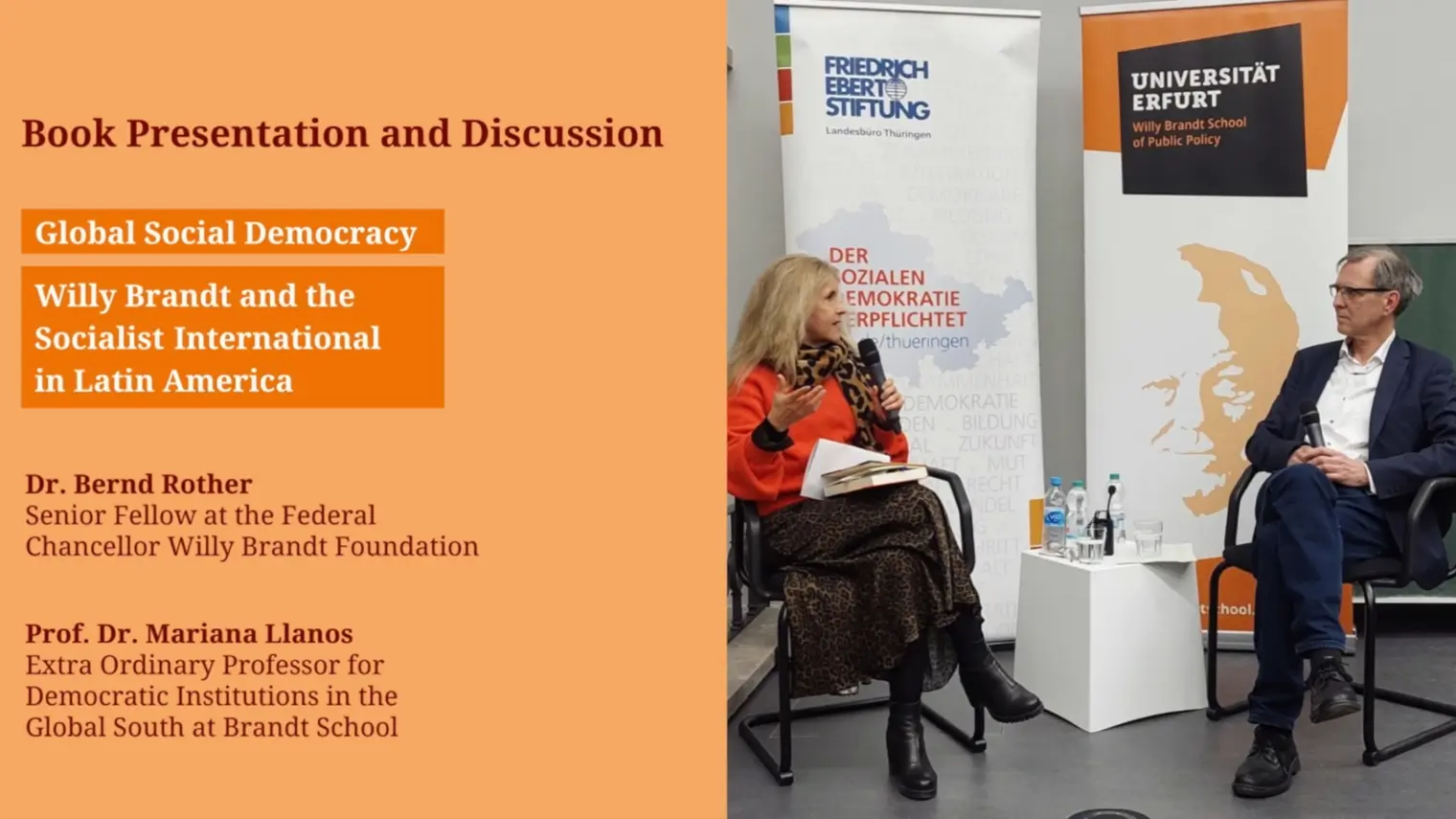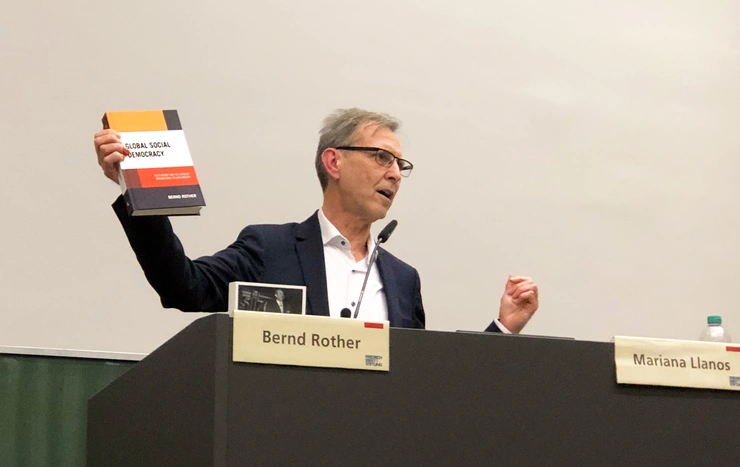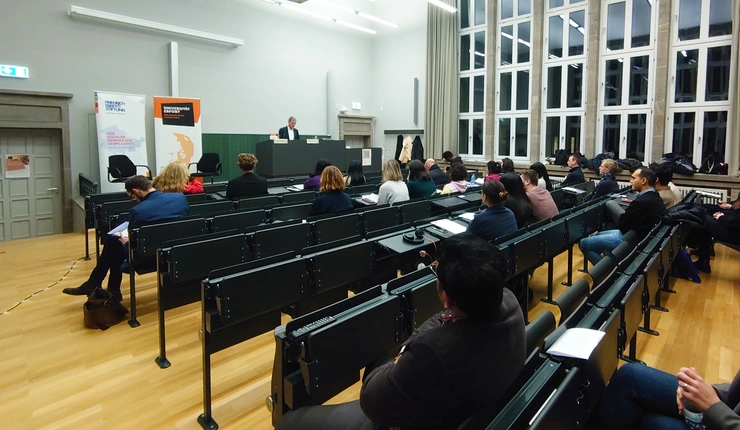Global Social Democracy - Willy Brandt and the Socialist International in Latin America
The Brandt School Guest Lecture Series brought together Dr. Bernd Rother, author of the book “Global Social Democracy: Willy Brandt and the Socialist International in Latin America”, and Prof. Dr. Mariana Llanos, the book discussant, in a book presentation and discussion session. Presenting his book, Dr. Rother chronicled Willy Brandt´s tenure as president of the Socialist International (SI) from 1976 to 1992, particularly his work with the socialist international in Latin America. Willy Brandt assumed the leadership of the Socialist International at a time when the organization was undergoing unprecedented generational changes in outlook and in its leadership and membership. Central to his tenure as president of the socialist international was his programme to further the ideals of the socialist international beyond Europe to Latin America, Africa, and Asia. He pursued a pragmatic approach geared towards the improvement of the conditions of people in various parts of the world rather than an insistence on social democratic purity.
Willy Brandt´s efforts led to increased exchanges with socialist political parties and groups in various parts of the world, but it was in Latin America that his programme achieved some successes. As president, Brandt navigated calls by leaders of the socialist international for more intervention by the European arm of the SI. His reluctance to intervene in the affairs of the socialists in Latin America was borne out of his conviction to avoid neocolonialism and paternalism. Rather, he sought a partnership between the socialists in Europe and Latin America. Willy Brandt worked to overcome the suspicion towards the European socialists by other arms of the socialist international due to its previous stance in not supporting decolonization and being seen as an imperialist ally of the United States. These moves were not one-sided but also witnessed an acceptance and approach from the Latin American side.
According to Dr. Rother, Latin American socialists drew closer to European socialists due to three key factors. First, they wanted to emulate the European welfare model that had been successful in improving the lives of workers in Europe. Second, they observed the peaceful transitions from dictatorship to democracy in Portugal and Spain and sought to replicate these in Latin America. Third, Latin American socialists needed global allies in their quest to dislodge U.S. hegemony from the continent. The engagement between the socialist international and their Latin American partners was marked by the tension inherent in the composition of the Latin American socialists owing to varying national interests. The large countries in Latin America looked to improve their terms of trade while the smaller countries sought solidarity to remove oligarchic structures. These competing aims meant Latin America partners focused more on the European socialists to the neglect of South-South cooperation. The realities on the ground in Latin America and the challenges of expanding the socialist international beyond Europe saw the realization of limited successes in promoting social democracy in Latin America.
Discussing the book, Prof. Llanos argued that the socialist international project driven by European socialists was more of an aspiration, a quest to spread social democracy around the world. She noted the existence of a contestation over the definition of democracy by European socialists and the realities in Latin America. In addition, Prof. Llanos then discussed whether non-European countries were ready for the political democracy that existed in Europe when such had not been fully achieved in places like Latin America. The floor was then opened to take questions and comments from members of the audience with a lively exchange from participants coming from Brazil, Armenia, Colombia, Germany, Nigeria, and Afghanistan.
The different perspectives highlighted a number of issues raised by the book presenter and discussant. Among them were the acknowledgement that the socialist international was a loose network of socialist countries and parties without the power to dictate policy or other action. Only under Willy Brandt's leadership was the SI an important global political actor, but neither before, nor after it. In addition, there was the conflict between ideology and pragmatism in the relationship between European socialists and their Latin American partners. The socialist international, especially the European socialists favored an incremental approach to political, economic, and social change that was not the case in Latin America or even Africa.
The guest lecture series revealed the complexities involved in the workings of global level political and social movements. It provided participants with the opportunity to critically evaluate the leadership of Willy Brandt as president of the socialist international. His leadership, no doubt visionary and pathbreaking, was challenged by the forces of complexity in cross-continental relationships, global orders, and the continuing struggle to improve the conditions of people all over the world. As Prof. Llanos concluded by calling all participants to be “mindful of the gaps that exist between a vision, big ideas, and the realities of implementation”. All participants agreed that Willy Brandt´s life, ideas, and work continue to resonate important leadership and policy lessons even today.
Author: Emmanuel Baba Aduku, Student Assistant at the Research Area Development and Socio-Economic Policies

Please note: Once you watch the video, data will be transmitted to Youtube/Google. For more information, see Google Privacy.



